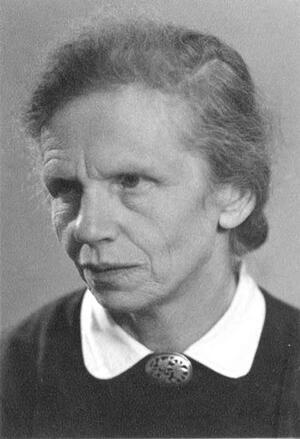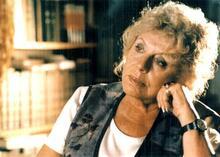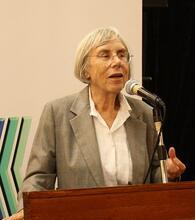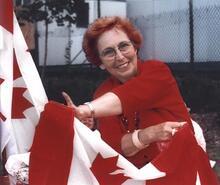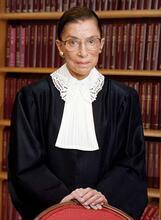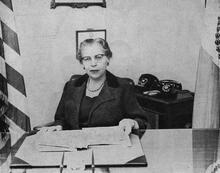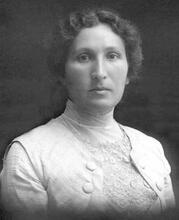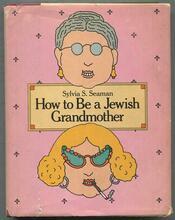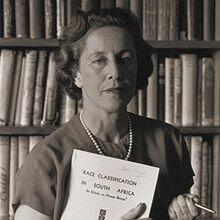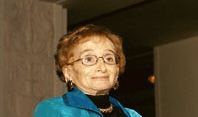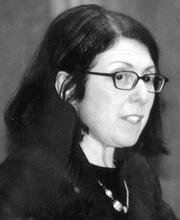Emma Levine-Talmi
Politician and writer, Emma Levine-Talmi, grew up in a liberal Jewish home in Warsaw before immigrating alone to Palestine in 1924 at the age of nineteen. She became a member of Kibbutz Ramat Yohanan before moving with her family to Givatayim, where she established a kindergarten. In 1955 she became a member of Knesset for the Mapam Party. During this time, she engaged primarily in social issues, including: equal rights for women, the fight against religious coercion, and education and the advancement of underprivileged sectors of the population. She was such a brilliant speaker that even her political rival, Menahem Begin, called her the “Knesset Nightingale.” Upon retiring from the Knesset, Emma Talmi returned to the kibbutz and to writing.
Emma Levine was born in Warsaw in 1905, the oldest daughter of Asher and Yehudit Levine. She had four siblings: Rachel (1907–1973), who emigrated to Palestine in 1929 with Ha-Shomer ha-Za’ir and was among the founders of A voluntary collective community, mainly agricultural, in which there is no private wealth and which is responsible for all the needs of its members and their families.Kibbutz Ein ha-Horesh, where she worked as a nursery-school teacher and raised her family; Emanuel, who also emigrated to Palestine, raised a family and engaged in light industry in Tel Aviv; Yehuda, who was killed in the Holocaust; the youngest sister, Sarah (1914–1950), who studied at a seminary for nursery-school teachers in Warsaw, worked at Janusz Korczak’s orphanage and emigrated to Palestine with a Ha-Shomer ha-Za’ir group. She was a member of Kibbutz Ramat Yohanan before moving with her family to Givatayim, where she established a model kindergarten. She died in childbirth at the age of thirty-six, leaving a husband and two children. Talmi’s parents immigrated to Palestine in 1935 and settled in Tel Aviv, where her father worked as a bookkeeper, writing in his spare time and publishing three books in Hebrew.
Immigrating to Palestine
Emma grew up in a warm, liberal Jewish home. She attended a Polish-Jewish school, joined Ha-Shomer ha-Za’ir when she was fifteen years old and was active in its branches. In 1924, at the age of nineteen, she emigrated alone to Palestine. Here she shunned no work of any kind, gaining experience in a wide range of occupations: agriculture, building and road paving. But as a result she frequently found herself unemployed, sick and under-nourished. After a while she found work at a kindergarten situated between Haifa and the Ahuza district, where a hut that belonged to the kindergarten also provided her accommodation.
In 1927, after three years of financial independence, she joined Kibbutz D of Ha-Shomer ha-Za’ir, which joined forces with Kibbutz B of Afulah to become Kibbutz Mishmar ha-Emek. She was the kindergarten teacher of the kibbutz’s first children and collected stories of the school in a book entitled We (Anahnu). Over time, more stories were added and the title was changed to Holiday held on the 14th day of the Hebrew month of Adar (on the 15th day in Jerusalem) to commemorate the deliverance of the Jewish people in the Persian empire from a plot to eradicate them.Purim in Elul.
In 1931 Emma went to Poland on a mission for her movement and there first met her future husband, Meir Talmi (Yudkes). Although he was a member of Kibbutz Ein Shemer, he joined Emma at Mishmar ha-Emek. When they married in 1934 Emma chose to call herself Levine-Talmi. The couple had three sons: Yigal (b. 1934), Yehuda (b. 1940), Benyamin (b. 1946), eleven grandchildren and sixteen great-grandchildren.
Work at the Knesset
Emma was for many years active in the Mapam membership department. In 1955 she became a member of Lit. "assembly." The 120-member parliament of the State of Israel.Knesset for the party, serving in that capacity for fourteen years, from the third Knesset until the end of the sixth (1955–1969). During this period she was appointed deputy speaker and was also a member of the Finance Committee, the Economics Committee and the Education and Culture Committee. She engaged primarily in social issues: equal rights for women, the fight against religious coercion, education and the advancement of underprivileged sectors of the population. She was so brilliant a speaker that even her political rival, Menahem Begin, dubbed her the “Knesset Nightingale.”
Writings and Publications
Upon retiring from the Knesset, Emma Talmi returned to the kibbutz and to writing. In 1922, at the age of seventeen, she had begun writing and publishing stories, first in Polish and later in Hebrew. In the late 1920s and the 1930s her work appeared in the Ha-Shomer ha-Za’ir periodical published in Warsaw and from 1931 it also appeared in Palestinian newspapers and journals such as Davar, Mishmar, Devar ha-Po’elet and in children’s papers. Emma, who loved telling stories about the kibbutz, often wrote for her kibbutz’s journal, Yedi’ot Mishmar ha-Emek. She also edited Mishmar ha-Emek ba-Ma’arakhah (Mishmar ha-Emek in wartime), which appeared after the War of Independence. Her books include In the Time of Tents (1949), When the Foliage Falls (1981), Simon Yurin and His Friends: A Man in the Shadows (1985) and the children’s books The Electricity Pole in Trouble (1941) and Purim in Elul (1954). In Between Frontiers (1944) and Barbed Wire on the Dniester (1941) she wrote about the Holocaust experience of the Jews of southern Russia and their fight with the aid of partisan emissaries sent from Palestine during and after World War II. Active in kibbutz life, she participated fully in preparing the various events that took place there and cared for the welfare of its workers. She died in the summer of 2004 and was buried in the kibbutz cemetery.

